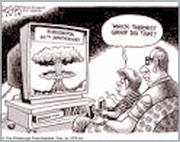Japan marks 62nd anniversary of end of war

As Japan marked the 62nd anniversary of its surrender in World War
II, Prime Minister Shinzo Abe on Wednesday pledged that this nation will
never again go to war.
While Abe and his Cabinet looked set to refrain from triggering
controversy by visiting war-related Yasukuni Shrine in Tokyo, one member
broke ranks and visited anyway.
In his speech at a government-sponsored memorial service for the war
dead, Abe said: "Our country caused considerable damage and sufferings
to many countries, particularly to people of Asian countries.
On behalf of the Japanese people, I offer deep remorse and express my
condolences to those who were killed."
Dozens of lawmakers visited Yasukuni Shrine, where 14 Class-A war
criminals are honored along with the nation's war dead.
Among them was Sanae Takaichi, a state minister whose
responsibilities cover matters related to Okinawa Prefecture, the scene
of heavy fighting in 1945.
Abe's entire Cabinet had indicated earlier that they would not visit
the shrine, apparently fearing a new backlash following the ruling
party's disastrous defeat in the July 29 Upper House election.
About 6,000 people attended a memorial service at the imposing Nippon
Budokan in Tokyo's Chiyoda Ward.
Some 5,200 participants were bereaved family members and their
escorts. The guests include Emperor Akihito and Empress Michiko, Lower
House Speaker Yohei Kono and Upper House President Satsuki Eda.
The service started before noon. Abe delivered his speech after the "Kimigayo"
national anthem was sung.
"I vow to firmly maintain Japan's pledge not to fight a war again and
take the initiative among other nations to contribute to building
eternal global peace," he said. Abe used the same wording as his
predecessor, Junichiro Koizumi, when he vowed to "firmly maintain the
pledge not to fight a war again."
At noon, the participants offered a silent prayer, followed by a
message from Emperor Akihito.
A total of 3.1 million people who died in the war were honored in the
service. Of that figure, about 2.3 million were members of the Imperial
Japanese Army or civilians who worked for it, including people from
Taiwan and the Korean Peninsula.
The remaining 800,000 were civilians killed in bombings and other
attacks. Kunizo Takakuwa, 71, whose father Yoshinosuke was killed in
China's Shanxi province, gave a speech representing the bereaved
families. "We will reaffirm that today's peace and prosperity are built
on the foundation of ultimate (sacrifices) and will work for global
peace with all our hearts and souls," he said.
In the 1997 memorial service, about 23.4 percent of all participants,
or 1,189 people, were women widowed by the war. But this year, they
accounted for only 2.2 percent, or 110 people, the lowest figure ever.
The oldest participant was Koto Matsuoka, 101, who came from Tokyo's
Suginami Ward.
The youngest was 10-year-old Honoka Nakaya from Kochi. Her
great-grandfather Toyonobu was killed when his ship was attacked en
route to Japan from China's Hainan island.
As for the Yasukuni controversy, Abe has refused to say whether he
will visit the Shinto shrine.
On Wednesday, Takaichi was the only Cabinet minister to pay respects
there. It is the lowest number since 1985, when then Prime Minster
Yasuhiro Nakasone visited the shrine, triggering a furor in Asia over
"official visits" by Cabinet ministers.
Since then, at least several Cabinet ministers have visited the
shrine each year. Koizumi, who last year became the first incumbent
prime minister since Nakasone to visit the shrine on the anniversary of
the war's end, arrived at Yasukuni's main hall in the morning.
Makoto Koga, chairman of the Japan War-Bereaved Families Association
and former secretary-general of the Liberal Democratic Party, also
visited early in the morning but refrained from going to the main hall.
(The Asahi Shimbun)
A south wind blows in Nagasaki as a reminder
White clouds drifted high above the bronze memorial that forms the
centerpiece of the Nagasaki Peace Park on Thursday. The breeze was
blowing from the south, just as it did on Aug. 9, 1945. Katsuki
Masabayashi, 68, was catching cicadas on that breezy day 62 years ago.
A split second after the blinding flash, he felt the tremendous
blast. A piece of bamboo pierced his belly, and he instinctively cried
out for his father, even though he knew he had already died in the war.
His younger sister, whom he was carrying piggy-back, shuddered and
moaned, "Mommy." Masabayashi described these moments as he read his
"plea for peace" during Thursday's ceremony to mark the 62nd anniversary
of the atomic bombing of Nagasaki.

"The act must never be justified, whatever one's position or personal
reasons may be," he stated firmly, his voice carrying above the
incessant droning of cicadas.
Charles Sweeney, the chief pilot of the B-29 plane that dropped the
A-bomb and changed the lives of Masabayashi and many other Nagasaki
citizens forever, returned to the city the following month.
Standing in the ruins of ground zero, Sweeney raised his head to gaze
at the blue sky. In his memoir, "War's End: An Eyewitness Account of
America's Last Atomic Mission," Sweeney recalls he felt neither regret
nor remorse for what he had done, firmly convinced that Japan's wartime
leaders were to blame.
A Roman Catholic, Sweeney never knew that the Urakami area of
Nagasaki leveled by the bombing was home to one of the highest
concentrations of Catholics in Japan.
Until his death in 2004 at 84, Sweeney held fast to the "argument of
the parties who dropped the bombs"-that bombing Hiroshima and Nagasaki
speeded up Japan's surrender.
Kokura, the primary target on Aug. 9, lay under a dense blanket of
smoke from an earlier U.S. air strike, making it impossible to see from
the air.
After three aborted attempts to release his deadly payload, Sweeney
decided to take his chance on his second target-Nagasaki. The city was
overcast. But a momentary break in the cloud cover appeared.
It was 74 hours and 47 minutes after the Hiroshima atomic bombing.So
a series of inevitable and accidental events sealed Nagasaki's fate. The
second A-bomb earned Sweeney a decoration and brought death to 74,000
people directly under the blast.
Fumio Kyuma had to resign as defense minister in July after he said
the atomic bombing "could not be helped." And voters in the July 29
Upper House election passed harsh judgment on the ruling coalition.
The path to complete nuclear disarmament, something that Hiroshima
and Nagasaki survivors fervently pray for, remains as arduous as ever.
Another Nagasaki A-bomb anniversary has come and gone. It was as if
the south wind blowing in Nagasaki was saying "wake up."
- (The Asahi Shimbun)
|
